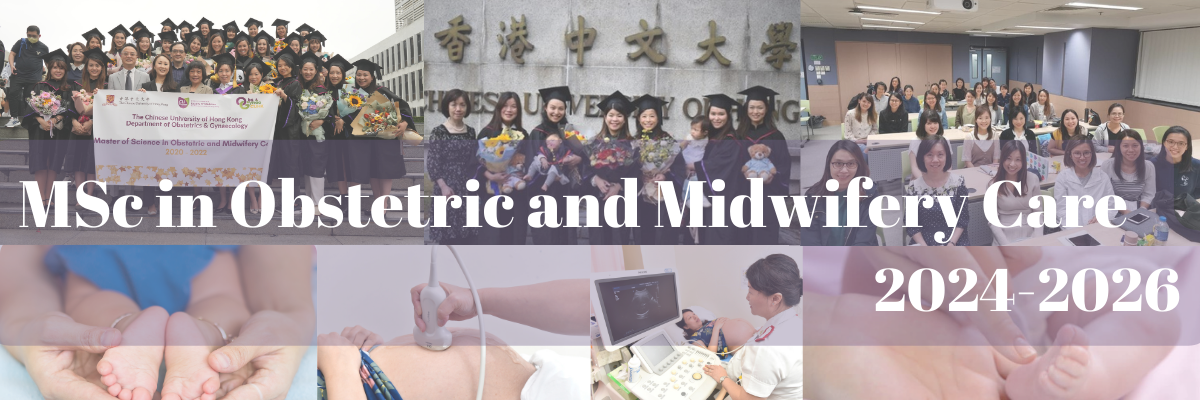Overall Curriculum


To qualify for conferment of MSc in Obstetric and Midwifery Care, 26 units must be completed from the programme’s core courses over two years in part-time mode.
- Required Course
- Elective Course
- Optional Course
 Year 1
Year 1
OBSC5001 Maternal and Infant Nutrition
The course enhances and consolidates our students’ knowledge on maternal and infant nutrition. In addition, it updates and broadens the visions of student on current feeding strategies from newborns to infants up to first year of life.
It includes:
- Global politics and national recommendations for maternal nutrition and infant feeding;
- Cultural and epigenetic influence on maternal diet;
- Nutrition assessment ,requirement and concerns during pregnancy and lactation;
- WHO directions on Breast-feeding and local policies on sustaining breast-feeding;
- Assessment, diagnosis and solving breast-feeding problems;
- Pathological and congenital conditions affecting nutrition and feeding;
- Special nutrition needs in preterm neonate;
- Infant nutritional requirement and oral care during first year of life.
OBSC5002 Clinical Leadership in Midwifery
This course enhances the ability and performance of students who are responsible to take up the clinical leadership role in the profession.
It includes:
- Relationship between professional autonomy and status;
- Theories and concepts about leadership, leadership styles, empowerment and the relationship between the sexes, leadership and empowerment;
- Future directions in midwifery;
- Changing dynamics of HK Midwifery profession;
- Workforce planning;
- Quality and safety management;
- Roles of consultant midwife;
- Roles of Hong Kong midwives from different health care setting: HA and private sectors;
- Developing clinical competency;
- Managing complaints;
- Face the media;
- Medico-legal issues in midwifery.
OBSC5003 Advanced Midwifery Practice- Part 1 – Practical Obstetric Ultrasound
First trimester screening and preeclampsia screening
First trimester pregnancy complications including ectopic pregnancy, molar pregnancy, miscarriage and fetal abnomalites
Fetal morphology scan at 20 weeks
Fetal Doppler assessment and Sonographic evaluation of fetal growth
Ultrasound of multiple pregnancies and complications
Ultrasound of uterine cervix and placenta
Intra-partum and post-partum ultrasound
OBSC5003 Advanced Midwifery Practice- Part 2 – Critical Care in Obstetrics
Develop knowledge update on current management of important medical problems in pregnancy
Develop basic skills in interpreting the images of the commonly used radiological examination in pregnancy
Enhance skills in caring critically ill pregnant women
OBSC5003 Advanced Midwifery Practice- Part 3 – Clinical Pharmacology in Obstetrics
To understand pharmacokinetic changes in pregnancy
To learn different mechanism of drugs used in various complicating pregnancy conditions
To know the specific observations and monitoring required during administration of medications
CNGT5007 Genetic Counselling
Genetic counselling is a communication process which involves [1] conveying medical facts including diagnosis, course of the disorder and available treatment; [2] understanding the pattern of inheritance and the risk of carrying the gene in specific relatives; [3] understanding the alternatives for dealing with the risk; [4] choosing an appropriate course of action by taking into account their risk, family goals, ethical and religious standard, and in accordance with their decision; [5] making the best possible adjustment to the disorder of the affected family member and/or the risk of recurrence of the disorder.
OBSC5007 Reproductive Medicine and Assisted Reproductive Technology
The course is to broaden student knowledge on reproductive problems and assisted reproductive technology. It includes:
- Investigation of infertility;
- Ovulation induction;
- Assisted reproductive technology;
- Complications of ART;
- Counseling of infertile complex.
 Year 2
Year 2
OBSC5004 Research Methodology
This course advances students understanding of research concepts, design,statistics and implementation. It includes:
- Research methodology;
- Statistical concepts;
- Legal and ethical issues in research.
OBSC5005 Project Dissertation
The course is to facilitate students to demonstrate competency in understanding of research methodology and basic statistical analysis by choosing one of the following as their dissertations
OBSC5006 Teaching and Learning in Midwifery Education
The course includes 2 parts:
(1) Teaching and Learning
(2) Public Health Education
This course enhances the competencies of midwives in teaching or mentoring role. Students will learn how to design a curriculum and improve teaching skills by demonstrating a classroom teaching. By addressing social and cultural behaviours, students can identify maternal health problems and learn how to conduct health promotion programmes.
OBSC5008 Professional Midwifery Practice Series– Part 1 – Promoting normal birth
Part 1 will enhance students’ confidence and ability in providing midwifery care in a low technology setting without compromising maternal and fetal well-being.
OBSC5008 Professional Midwifery Practice Series– Part 2 – Maternal physical and mental health well-being
Part 2 will update students’ knowledge in understanding the current community development of maternal and child health care in at risk population and the management of pelvic problems resulting from childbirth.
OBSC5009 Grief Experience in Pregnancy
The course is to enhance the competencies of students in counseling role.
It includes:
- Biology of pregnancy loss (miscarriage, induced abortion, ectopic pregnancy, stillbirth)
- Psychopathology on grief process
- Theories of grieving process, influencing factors and appropriate interventions
- Physical and psychological impact to women after hysterectomy
- Impact of maternal death to a family and intervention
- Clinical applications and ethical perspectives on grieving counselling
- Signs and symptoms of burnout and midwife’s self care
- Improve skill in working with families during the crisis

